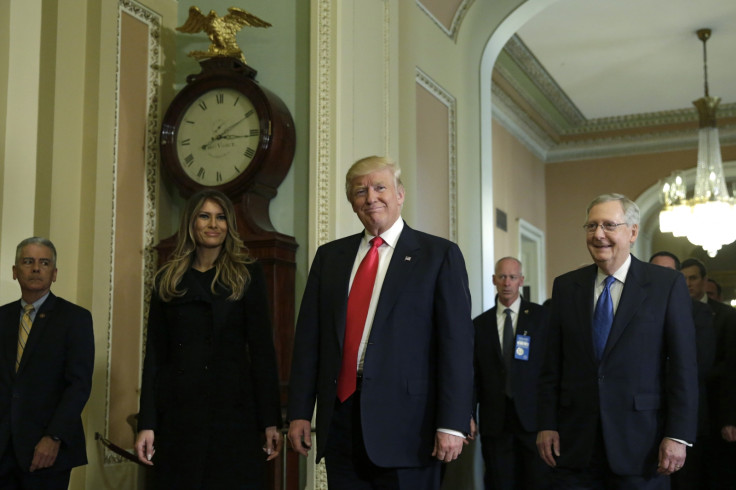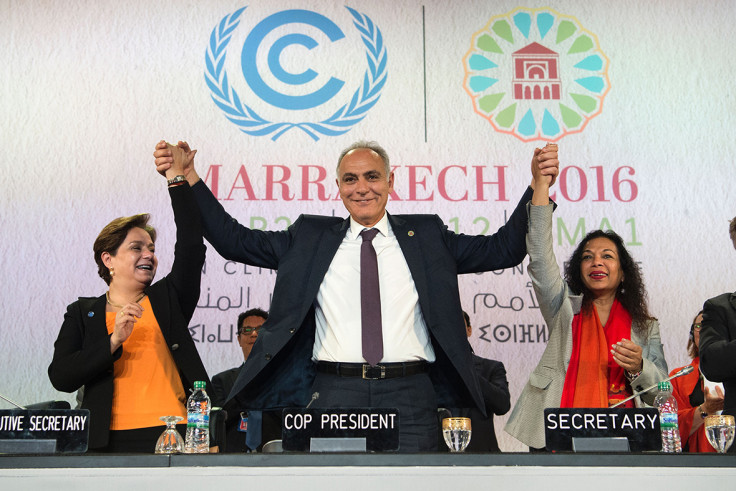Donald Trump and Myron Ebell are the climate deniers' dream team: Here's why
Climate deniers have been on the sidelines for years. What will happen now they're in charge?
Those who fly in the face of science lost ground under the Obama administration, but now they hold the reins again.
At his most outspoken, Donald Trump has outright denied climate change. It's a hoax by the Chinese, he's tired of hearing about it and it just isn't happening, he has said. But his views have fluctuated wildly, offering hope to those who want him to take a more moderate stance.
However, Trump's choice of leader for the transition period at the Environmental Protection Agency has finally sent a clear message on climate change.
His choice? Staunch climate sceptic Myron Ebell.
Who is Myron Ebell?
Next to Trump, Ebell is solid and consistent on climate change. What they have in common is a stated desire to undo many of the Obama Administration's policies to tackle it.
"Ebell's views don't fluctuate very much," Douglas Crawford-Brown, director of the Cambridge Centre for Climate Change Mitigation Research, told IBTimes UK. "It's quite clear that it's going to be a hard slog for the climate policies to continue as they currently are."
Ebell, the director of the Center for Energy and Environment at the Competitive Enterprise Institute – which has strong links with the energy industry and does not reveal its sources of funding – is a prominent climate-change sceptic. He has a long record of arguing to scrap environmental regulations intended to protect wildlife and the environment. He doesn't just deny climate change is happening: he welcomes it.
To those campaigning to stop climate change, the appointment is a shock and a disappointment.
"I would put Ebell in the group of radicals out to try and sabotage the world's dealing with the biggest problem we're facing," says James Thornton, chief executive of environmental law organisation ClientEarth. "To have someone at the EPA who is a denier of climate change is a bad sign."
"In terms of US engagement with environmental policy, it doesn't look good. It looks worse now, given who he's appointed to head up the EPA. I think Trump's intentions are clearer and clearer," says Peter Cox, professor of climate system dynamics at the University of Exeter.
To those who aren't bothered about climate change, Ebell and Trump are a dream team.
"Myron has a proven track record of questioning excessive regulations, that have come down from the federal level, that have minimal, if any, meaningful environmental benefit," says Nicolas Loris, an economist who focuses on energy, environmental and regulatory issues at The Heritage Foundation, a conservative think-tank known for its anti-climate-change-regulation stance. "I can see why the transition team chose [Ebell] to lead the transition to an EPA."
Loris acknowledges that anthropogenic climate change is happening but, like Ebell, he says that it's not a risk that we have to worry about. "In terms of the science, yes there is warming, yes man-made emissions are contributing to that, but it doesn't mean we are heading to the catastrophe that some of the alarmists make it out to be," he says.
"Yes, there's been warming but let's hold off on these doomsday scenarios."
Is it just climate science that Ebell rejects?
Some have accused Ebell of being not only anti-climate-change, but anti-science altogether.
"I'd put Ebell in the Lord Lawson camp, which is that climate policy is simply based on wrong science and therefore he takes the position, 'I don't care what the business community says, the science is wrong'," says Crawford-Brown.
It's not just Ebell's and Trump's positions on climate change that concern Crawford-Brown. "What worries me more is that both of them are profoundly anti-scientific. Neither one of them seems to have any conception of how science operates."
This could consequently lead to a lot of decisions that simply fly in the face of the existing science, not just in terms of the environment, says Crawford-Brown. "I worry about that more general attitude that one doesn't have to pay attention to the scientific facts, because that starts leading in all sorts of bad directions."
This chimes well with Trump's post-truth approach to politics, says Cox. "Oftentimes, especially in politics, what you accept as the truth depends on what its consequences are. In science, actually, we're not allowed to do that. Our core values are that you agree on what the truth is regardless of what the consequences are."
But Loris thinks that Ebell's stance on science is right. "I don't want to speak for Myron, but I think he takes a very pragmatic look at the science. I wouldn't call him a denier by any means. I think he looks at this from a realist's perspective," says Loris. But Ebell does deny that climate change is a serious problem. He even reprimanded the Pope for trying to inspire action to take care of the planet.
Positions such as these might seem more dramatic now they're held by people in positions such as leading the EPA – and the US – but they never went away. "To be honest it's not new for us in climate science to be up against opinions that resist what seems to us to be obvious facts and science. It is a long-term battle," says Cox.
"There remain these resistant, sceptical groups who have core values and vested interests that lead to a fight against [the climate change movement]. It's not gone away, it never went away. It might be that Trump's presidency steels us to really deal with these issues once and for all."
How far could he go?
Loris expects Ebell to call into question not only policies such as the Clean Power Plan to reduce pollution from power plants, but a host of environmental regulations.
"I think he's going to take a serious look at the costs and benefits of a lot of the regulations that have been promulgated by the Obama administration," says Loris. "It very may well consider eliminating the greenhouse gas regulations for new and existing power plants, shutting the door on the Clean Power Plan."
Loris also says he expects Ebell to "take a second look" at the US's involvement with the UN climate process as a whole. "I think the international approach has been very costly, ineffective and unworkable," he says.
However, withdrawing entirely from the UNFCCC would seriously damage the US's international reputation, Thornton says. "If it were to happen we would hope it would be met with strong condemnation by the international community, particularly China and India."
In general, Loris expects Ebell to see just how far environmental regulations can be unwound. "How can we restructure environmental regulation in the US generally? We've had these landmark pieces of legislation like the Clean Air Act and the Clean Water Act and they served some purpose, but I think they're largely outdated for the environmental challenges that the US faces today."
"I think the Trump Administration is just going to try to dismantle all the climate policies," agrees Crawford-Brown.
Scrap the Clean Power Plan?
The Clean Power Plan – which Obama established by executive order in 2015 – seems very likely to be the first to go. "What the executive office puts in place the executive office can take away," says Crawford-Brown. "I wouldn't be at all surprised to find that Trump just cans it early on," he says.
Romany Webb, climate lawyer at the Columbia Law School, agrees that the plan is likely to be first in the firing line.
"President-elect Trump was highly critical of the Clean Power Plan on the campaign trail," she says. "There are several ways in which he could kill the plan." The first would be by passing legislation in the House and the Senate. This would not be a great challenge as both are controlled by the Republicans, who are very critical of the plan.
But even without legislation, the Trump Administration could take steps to undo the plan, Webb says. The US Court of Appeals for the District of Columbia Circuit is already considering the plan after it was challenged by a group of Republican states. The court is expected to issue its ruling on the plan early next year.

If the court finds in favour of the challengers, it would give the EPA an opportunity to reconsider the rule. "But it should be noted that EPA couldn't just say, 'We changed our mind, we're getting rid of the rule.' They would have to provide a reasoned explanation for undoing the rule," Webb says.
"Other regulations could also be at risk," adds Webb. "One example is the recently finalised regulations controlling emissions of methane and volatile organic compounds from new oil and gas facilities."
Scrap the whole EPA?
The future of the EPA as a whole is not certain, if Trump's rhetoric is to be believed. Nor is Trump alone in his aversion to the work that the agency does. There are strains within the Republican Party that would like to shut down the EPA altogether, says Crawford-Brown, who was a science adviser to the EPA for 18 years.

But it may be a lot harder than Trump hopes to shut down entirely. He is not the first president to have had such ambitions.
Ronald Reagan appointed Anne Gorsuch as administrator to make drastic cuts at the agency. Thornton says that this bodes well for those who want to preserve existing environmental regulations. While Gorsuch did make significant cuts to the agency, there was much that she couldn't touch.
"What I think surprised them both is that they did not succeed in shutting down the EPA. Because [despite] their radical position being against environmental health and regulation, the American people are actually very much in favour of it," says Thornton.
Trump and Ebell may find areas of the EPA easier targets than others. The part of the EPA responsible for enforcing regulations and monitoring power stations and air quality has been historically harder for the government to hit, says Crawford-Brown. The research side of what the agency does, however, is a softer target for cuts, he says.
What stands in the way of the deniers' dream team?
Some hope that the momentum behind the green technology, broader sustainability industry and even mainstream industry that is already adapting to climate change might appeal to Trump's business-minded approach. Cox sees hope here, if the momentum can be maintained despite doubts at the top levels.
"There is a juggernaut now – it's not moving fast enough – but it is moving towards different ways of doing things," says Cox. "There are people who want to do that regardless of what politicians say. We're not controlled by what politicians insist that we do or what we believe. I still think we're going in the right direction."
"There is a very large contingent within the business community who are backing climate policies and who think it's vitally important that we have good, sound climate policies," agrees Crawford-Brown. "So it could be that the business community could rally behind the climate action."

Ebell won't receive much popular support for any attempts to dismantle environmental regulations, says Thornton. "Ebell isn't on the side of the people. One can only hope that Trump wants to continue to be on the side of the people. The majority of the American people want the government to do something about climate change."
But not everybody thinks so. Loris believes that the American people, particularly lower-income households that spend a greater proportion of their income on energy, would benefit from looser environmental regulations. "I think that should be a priority for the next administration to undo some of these regulations that are all economic pain and no economic gain."
"Earlier administrations didn't succeed in getting rid of environmental laws and I don't think this one will either," says Thornton. "Overall, over all the decades progress continues being made. But with climate change the window is quite small for us to make significant improvements if we're going to save civilisation from suffering and some very severe consequences."
Sustaining the American way
This is not the first time that climate sceptics have been in charge. Environmental laws survived presidents from Reagan to George W. Bush. It's the narrow window for change that is the problem.
If Trump were to be in office for two terms, or if America leaves the Paris agreement, then we would have missed a large part of the opportunity to act, Thornton says. "The frustration is that there isn't much time to make this work. If you're having to fight any rearguard action it prevents you from making progress just when progress needs to be made."
If you actually want to take care of the economy and provide jobs for people, realising that climate change is real and doing something about it has to be a core part of the approach, he says. He's far from alone. The 2006 Stern review of the economics of climate change found that the costs of doing nothing were much higher than strong, early attempts at mitigation.
"If Trump were to follow Ebell's darkest wishes, and take America out of the Paris Agreement, America would essentially become a free-rider on the backs of the other countries who are trying to reduce carbon emissions. Now that's not the American way, being a free-rider," Thornton says. "It would be a very un-American thing to do to make everyone else people pay for you."
Cox agrees that the pursuit of freedom, in the American sense, actually requires action on climate change. "As time goes by, people think, hold on a minute, is it freedom to have loads of poor air quality? Is it freedom to be suffering from environmental extremes that lead to problems with crops and with people?"
The real hope might lie in Trump's opportunism, says Cox.
"He may well think this is quite an opportunity for the US. If I were thinking I want to build a better world for my people – and I don't doubt that he does want to do that, even though the things he says are bizarre – then I would be thinking, how do I make the environment safer for them, how do I provide them with new jobs that are secure?"
© Copyright IBTimes 2025. All rights reserved.





















